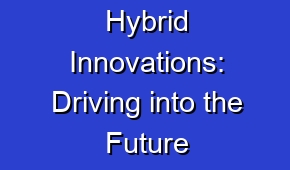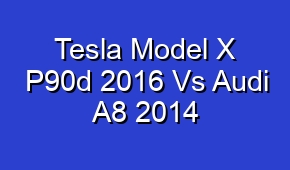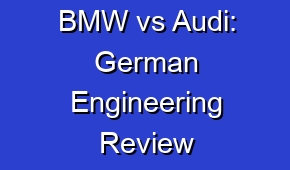Hybrid Innovations: Driving into the Future

Discover the future of driving with hybrid innovations. This article explores how hybrid technology is revolutionizing the automotive industry, offering a sustainable and efficient solution for transportation. Dive into the advancements in hybrid vehicles and learn about the benefits they bring to both drivers and the environment.
Hybrid innovations are revolutionizing the future of driving, offering a sustainable and efficient solution to our transportation needs. With the increasing concern for the environment, hybrid vehicles have gained popularity for their ability to reduce emissions and improve fuel economy. These innovative cars combine the power of an internal combustion engine with an electric motor, resulting in improved performance and reduced carbon footprint. The future of driving lies in the hands of hybrid technologies, as they offer a cleaner and more cost-effective alternative to traditional petrol or diesel-powered vehicles. As technology advances, we can expect to see even more innovations in the hybrid space, such as improved battery technology, regenerative braking systems, and advanced energy management systems. With these advancements, hybrid vehicles will continue to play a crucial role in shaping the future of transportation.
| Hybrid innovations are revolutionizing the future of driving with their eco-friendly technology. |
| Hybrid vehicles combine electric and combustion engines for improved fuel efficiency. |
| The use of hybrid technology reduces emissions and promotes a cleaner environment. |
| Electric motors in hybrid cars provide instant torque for quick acceleration. |
| Hybrid innovations offer drivers the flexibility to switch between gasoline and electric power. |
- The integration of regenerative braking in hybrid vehicles helps recharge the battery while decelerating.
- Hybrid cars typically have a longer range compared to fully electric vehicles.
- The combination of electric and combustion engines in hybrids provides enhanced performance.
- Fuel efficiency is greatly improved in hybrid vehicles, resulting in cost savings for drivers.
- The development of advanced battery technology is driving the future of hybrid innovations.
What are the advantages of hybrid cars?
Hybrid cars offer several advantages over traditional gasoline-powered vehicles. One of the main benefits is improved fuel efficiency. The combination of an internal combustion engine and an electric motor allows hybrid cars to consume less fuel, resulting in lower emissions and reduced dependence on fossil fuels. Additionally, hybrid cars often have regenerative braking systems that convert kinetic energy into electricity, further increasing their efficiency.
| Reduced Fuel Consumption | Lower Emissions | Improved Fuel Efficiency |
| Hybrid cars combine an internal combustion engine with an electric motor, resulting in significantly lower fuel consumption compared to conventional cars. | Hybrid cars emit fewer pollutants and greenhouse gases, contributing to improved air quality and reduced environmental impact. | Hybrid cars use advanced technologies, such as regenerative braking and start-stop systems, to optimize fuel efficiency and maximize energy conservation. |
| Cost Savings | Increased Driving Range | Government Incentives |
| Hybrid cars typically have higher upfront costs, but they can save money in the long run through lower fuel expenses and potential tax incentives. | Some hybrid models offer extended driving ranges by switching between the internal combustion engine and electric motor, providing flexibility for long-distance travel. | Many governments provide incentives, such as tax credits and rebates, to encourage the adoption of hybrid cars, making them more affordable for consumers. |
How do hybrid cars work?
Hybrid cars work by combining the power of an internal combustion engine with an electric motor. The engine is responsible for generating power and charging the battery, while the electric motor assists during acceleration and low-speed driving. The battery is recharged through regenerative braking or by using excess power from the engine. The car’s computer system determines when to use the engine, electric motor, or both based on driving conditions and power demands.
- Hybrid cars use a combination of an internal combustion engine and an electric motor to power the vehicle.
- The internal combustion engine runs on gasoline or diesel fuel and is used to generate power for the car’s battery and drive the wheels.
- The electric motor is powered by a battery pack, which is recharged through regenerative braking and the internal combustion engine. It assists the engine during acceleration and provides power at low speeds, reducing fuel consumption and emissions.
Are hybrid cars more expensive to maintain?
While hybrid cars may have higher upfront costs compared to traditional vehicles, they are generally not more expensive to maintain. In fact, some maintenance costs may be lower for hybrids due to their regenerative braking systems, which reduce wear on brake pads. Additionally, hybrid cars often come with longer warranties that cover key components such as the battery pack. It’s important to note that maintenance costs can vary depending on the specific make and model of the hybrid car.
- Hybrid cars generally have more complex systems compared to traditional gasoline cars, which can lead to higher maintenance costs.
- The battery packs in hybrid cars may need to be replaced after a certain number of years, which can be expensive.
- Hybrid cars often require specialized technicians and equipment for maintenance, which can increase the cost of servicing.
- Some hybrid cars have unique parts that may be more expensive to replace compared to traditional cars.
- However, hybrid cars may require less frequent oil changes and have lower brake wear, which can offset some of the maintenance costs.
What is the future of hybrid cars?
The future of hybrid cars looks promising as advancements in technology continue to improve their performance and efficiency. Manufacturers are investing heavily in research and development to enhance battery technology, increase electric range, and reduce costs. As governments around the world implement stricter emissions standards, hybrid cars are expected to play a significant role in reducing greenhouse gas emissions and transitioning towards a more sustainable transportation system.
| Increased Fuel Efficiency | Reduced Emissions | Advancements in Technology |
| Hybrid cars are expected to become even more fuel efficient in the future, leading to cost savings for drivers. | With stricter emission regulations, hybrid cars will play a crucial role in reducing greenhouse gas emissions and air pollution. | Ongoing research and development in hybrid technology will result in improved performance, longer battery life, and faster charging capabilities. |
| Transition to Electric | Expansion of Hybrid Models | Infrastructure Development |
| The future of hybrid cars is closely tied to the transition towards fully electric vehicles, as hybrid technology serves as a bridge between traditional combustion engines and electric motors. | Automakers are expected to introduce a wider range of hybrid models, providing consumers with more options and driving down prices. | The growth of hybrid cars will require the development of a robust charging infrastructure, including more charging stations and improved battery technology. |
How long do hybrid car batteries last?
The lifespan of hybrid car batteries can vary depending on various factors such as driving habits, climate conditions, and maintenance. On average, hybrid car batteries are designed to last between 8 and 10 years or around 100,000 to 150,000 miles. However, advancements in battery technology are continuously improving durability and longevity. It’s worth noting that most manufacturers offer warranties on hybrid car batteries to provide peace of mind to owners.
The lifespan of hybrid car batteries can vary, but on average they last around 8 to 10 years.
Are hybrid cars better for the environment?
Hybrid cars are generally considered better for the environment compared to traditional gasoline-powered vehicles. The combination of an internal combustion engine and an electric motor results in lower fuel consumption and reduced emissions. Hybrid cars produce fewer greenhouse gases and contribute to improved air quality. However, it’s important to consider the source of electricity used to charge the electric motor, as this can impact the overall environmental impact of a hybrid car.
Hybrid cars are considered better for the environment due to their lower emissions and higher fuel efficiency.
What are the challenges of hybrid cars?
While hybrid cars offer many benefits, they also face certain challenges. One challenge is the higher upfront cost compared to traditional vehicles. Additionally, finding charging infrastructure for plug-in hybrid cars can be a limitation in some areas. Another challenge is the limited electric range of some hybrids, which may require frequent switching between the engine and electric motor. However, advancements in technology and increased adoption of hybrids are expected to address these challenges in the future.
1. Cost
Hybrid cars tend to have a higher upfront cost compared to conventional gasoline-powered vehicles. This is primarily due to the expensive battery technology used in hybrid vehicles. Although the cost of hybrid cars has been decreasing over time, they still tend to be more expensive than their non-hybrid counterparts.
2. Limited Electric Range
Hybrid cars typically have a limited electric range compared to fully electric vehicles. While they can rely on the gasoline engine for longer distances, the electric range of hybrid cars may not be sufficient for those who frequently drive long distances or have limited access to charging infrastructure. This can be a challenge for individuals who are looking for a vehicle with a longer electric range.
3. Maintenance and Repair
Hybrid cars have a more complex powertrain system compared to conventional vehicles, which can result in higher maintenance and repair costs. The specialized components and systems in hybrid cars may require specific expertise and equipment for servicing, which can be more expensive and less widely available. Additionally, the battery pack in hybrid cars may need to be replaced after a certain period, which can be a significant expense.





















